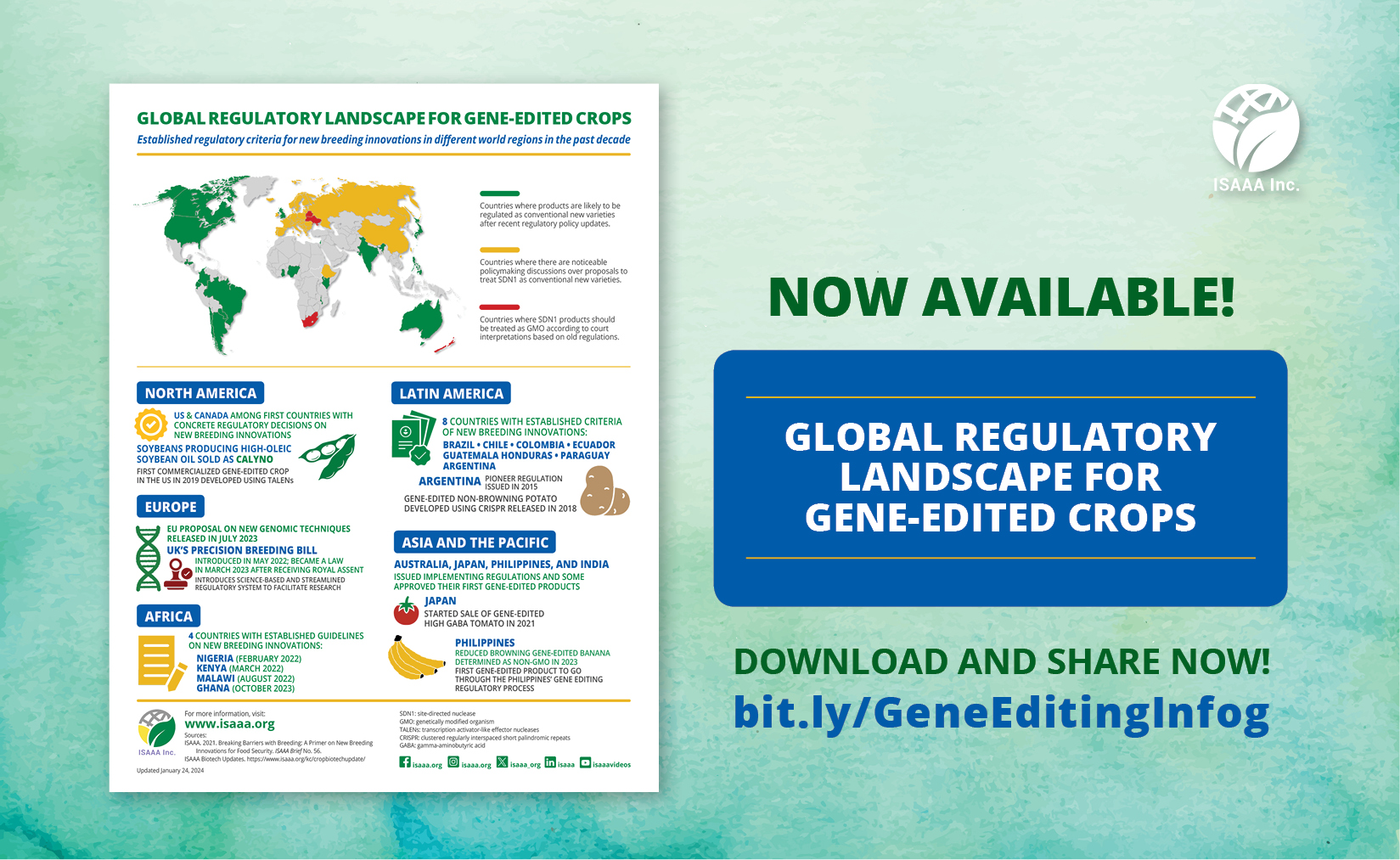Updates on Global Regulatory Landscape for Gene-Edited Crops
| |
In the past decade, gene editing and other breakthroughs in molecular biology led to new techniques for easing genetic improvement. These techniques do not lead to different results from those that earlier techniques could obtain, but they allow scientists to reach the same results easier, faster, and with increased knowledge/control of the outcome.
These techniques are now being discussed globally. Many questions have been asked about the regulation of crops developed using gene editing techniques. Will the regulations on genetically modified (GM) products apply to gene-edited products? Several countries have established regulatory guidelines for new breeding innovations, and these are summarized in ISAAA Brief 56, published in December 2021.
Since then, other countries in Asia, Africa, and Europe established regulatory guidelines for new breeding innovations. Some of these updates are included in the new infographic "Global Regulatory Landscape for Gene-edited Crops," which also features some of the products developed using CRISPR and TALENs. Below are the details.

Asia
In 2020, Japan's Ministry of Health, Labour and Welfare published the final guidelines, which state that gene-edited plants and food can be sold to consumers without safety evaluations as long as the techniques involved meet certain criteria, a process similar to what is adopted in the United States, but developers must send notification to the government. On September 15, 2021, Sanatech Seed Co., Ltd., together with its partner for sales Pioneer EcoScience Co, Ltd., started the sale of their genome-edited tomatoes with increased gamma-aminobutyric acid (GABA) called Sicilian Rouge High GABA. The tomato was edited using CRISPR-Cas9 to contain high levels of GABA, an amino acid believed to aid relaxation and help lower blood pressure. Developed in collaboration with the University of Tsukuba, the Sicilian Rouge High GABA is the world's first gene-edited tomato.
On March 20, 2023, the Ministry of Health, Labour, and Welfare and the Ministry of Agriculture, Forestry, and Fisheries in Japan gave their green light to a high-starch maize variety, the fourth genome-edited food product that Japan did not subject to regulations for genetically engineered crops.

India's Ministry of Environment, Forest and Climate Change announced on March 30, 2022, the exemption of genome-edited plants without foreign genes from being treated as transgenic products. The Memorandum states, “SDN1 and SDN2 genome-edited products free from exogenous introduced DNA be exempted from biosafety assessment in pursuance of rule 20 of the Manufacture, Use, Import, Export and Storage of Hazardous Microorganisms/Genetically engineered Organisms or Cells Rules 1989.” The final guidelines for the safety assessment of genome-edited plants were released on May 17, 2022. The guidelines serve as a road map for the development and sustainable application of genome editing, including the regulatory pathways to be taken for the release of genome-edited plants.
On May 19, 2022, the Philippine Department of Agriculture (DA) published the rules and procedures for the evaluation of products of plant breeding innovations (PBI). The regulations, marked as Memorandum Circular No. 8, Series of 2022 (MC8), provide a science-based and efficient process for the assessment and determination of whether gene-edited plants are to be considered genetically engineered (GE) or not.
In April 2023, the DA Bureau of Plant Industry determined that Tropic's reduced-browning banana is not a GMO. It was the first gene-edited product to go through the country's gene editing regulatory process.
Europe
During the Opening of the Parliament on May 10, 2022, Queen Elizabeth II announced in her speech the creation of the Genetic Technology (Precision Breeding) Bill to encourage agricultural and scientific innovation in the United Kingdom (UK). The Precision Breeding Bill was sponsored by the Department for Environment, Food and Rural Affairs (Defra) and welcomed by experts, scientists, and scientific institutions and organizations in the UK.
On May 25, 2022, the Precision Breeding Bill was introduced to Parliament. The Bill was then introduced to the House of Lords in November 2022 after its third reading in the House of Commons on October 31. On February 3, 2023, the Bill passed its third and final reading at the House of Lords with no further amendments and was moved to the Commons for consideration of the Lords' previous amendments. In a historical event following an agreement by both Houses on the text of the Bill, the Precision Breeding Bill received Royal Assent on March 23, 2023, and became an Act of Parliament and law.
On July 5, 2023, the European Commission released its proposal on New Genomic Techniques (NGTs) and Plant Reproductive Material (PRM). The proposal, which was suggested by the Council of the European Union in 2019, suggests that plants derived from targeted mutagenesis and cisgenesis be categorized separately from genetically modified organisms (GMOs) and also introduces a notification process for “conventional-like” category 1 plants to confirm their status.

In late July 2023, the EU’s Agriculture Ministers met to discuss the Commission’s proposal for the first time. The discussion saw many ministers welcome the Commission's proposed loosening of gene editing rules as a building block for sustainable farming, while others voiced concerns over potential risks. In early December, the Ministers failed to agree on a position on NGTs. The Spanish European Union Council Presidency, which ended on December 31, 2023, aimed to seal a deal on the Council's position on the file during a meeting on December 11, but their offering failed to reach the necessary majority for a general approach on NGTs.
On January 24, 2024, the European Parliament's Environment Committee is set to vote on the proposal for NGTs.
Africa
In September 2021, during the Africa Biennial Biosciences Communication Symposium (ABBC 2021), the African Coalition for Communicating about Genome Editing was launched. The Coalition is a platform for fostering open and transparent dialogue on genome editing in the continent.
On February 10, 2022, Nigeria's National Biosafety Management Agency (NBMA) announced the national guidelines on gene editing and distributed printed copies of the guidelines to the public. The Director-General/Chief Executive Officer of NBMA, Dr. Rufus Ebegba, stressed NBMA's dedication to ensuring that all gene-edited products in Nigeria are properly regulated. The guidelines state that gene-edited products that are not considered GM due to lack of foreign DNA may not need to go through the rigorous biosafety process.

After Nigeria, Kenya became the second African country to publish their genome editing guidelines in March 2022. The National Biosafety Authority (NBA) published the guidelines, marking an important step towards the development of a genome editing regulatory framework in the country. The published guidelines provide clarity on which genome-edited organisms and/or derived products will be regulated under Kenya's Biosafety Act and which products are regulated as conventional varieties or breeds.
Kenya's National Biosafety Authority is the only country in Africa that has made three decisions based on the Genome Editing Guidelines Early Consultation Approach. These include nitrogen-fixing bacteria edited to attach with non-leguminous crops and higher nitrogen fixation, Maize Lethal Necrosis resistance in maize, and Striga resistance in sorghum.
In August 2022, Malawi approved its Genome Editing Guidelines, marking a key step towards fostering a supportive biosafety regulatory environment in the country. The guidelines direct the review and evaluation of genome editing applications and products thereof. The guidelines provide a step-by-step procedure to be followed in regulating genome editing and its products and give a clarification on which products to be exempted from being regulated as GMOs. The guidelines state that products containing novel combination of DNA will be regulated as GMOs.
On October 30, 2023, Ghana's National Biosafety Authority (NBA) published the Guidelines on Genome Editing to provide procedural guidance to potential applicants on the categories of genome-edited organisms and/or their products that shall be regulated under the Biosafety Act, 2011 (Act 831). In releasing the guidelines, Ghana joined Nigeria, Kenya, and Malawi as the fourth African country with validated guidelines for genome editing.
For more information, download and read ISAAA Brief 56 and the new infographic from the ISAAA website. For the latest gene editing guidelines and products, subscribe to the Biotech Updates.
For further reading:
- Japan Starts Sale of Genome-Edited High-GABA Tomato
- Japan Gives Nod to Genome-edited Waxy Maize
- India Exempts Genome-Edited Plants from Biosafety Assessment
- India Eases Process for Release of Genome-edited Plants Without Foreign DNA
- Philippines Releases Regulations for Gene-edited Plants
- Tropic's Gene-Edited Banana Determined as Non-GMO in the Philippines
- Precision Breeding Act Unlocks Key Technologies for UK’s Food Security
- A Short Timeline of EU’s Proposal on NGTs
- EU Agriculture Ministers Fail to Find Compromise on NGTs
- African Coalition for Communicating Genome Editing Launched as Bioscience Symposium Concludes
- Nigeria Releases National Guidelines on Gene Editing
- Kenya Publishes Genome Editing Regulations Becoming Second African Country To Do So
- Malawi's Genome Editing Guidelines key in Promoting Supportive Environment for New Breeding Technologies
- Latest Developments in Genome-editing Regulation
- Points to Ponder on Gene Editing: Can We Edit the Future of Food?
| Newer Post | Archive | Older Post |
Science Speaks is ISAAA Inc.'s official blog. Weekly blog articles, authored by ISAAA writers, partners, and invited contributors, aim to help share, disseminate, and promote scientific knowledge and its vital role in achieving global agricultural sustainability and development. Your support to Science Speaks will help us achieve this goal. You can help us by donating as little as $10.

